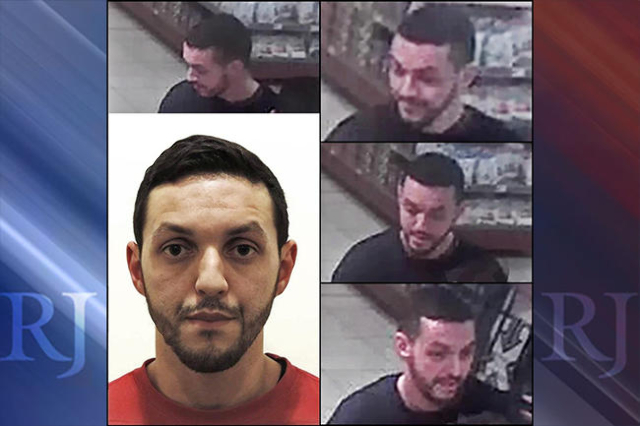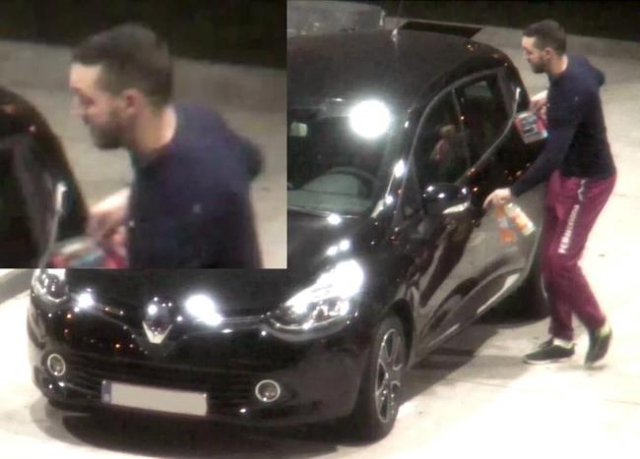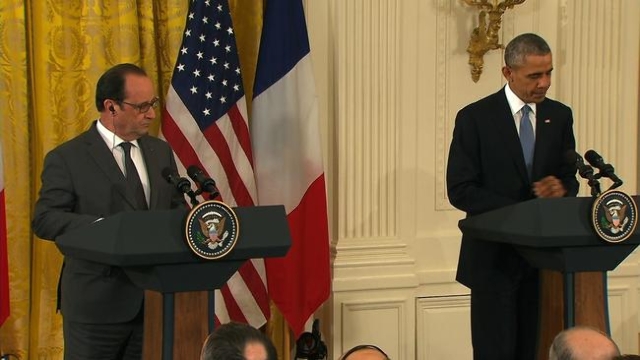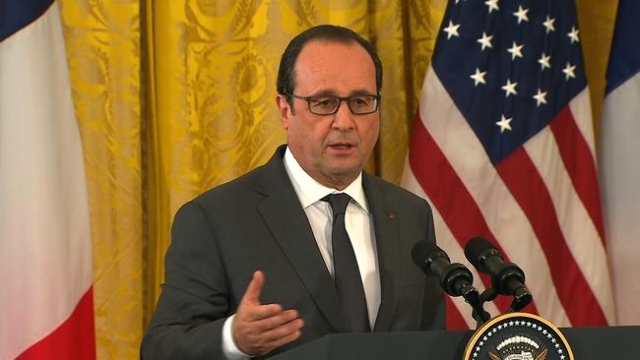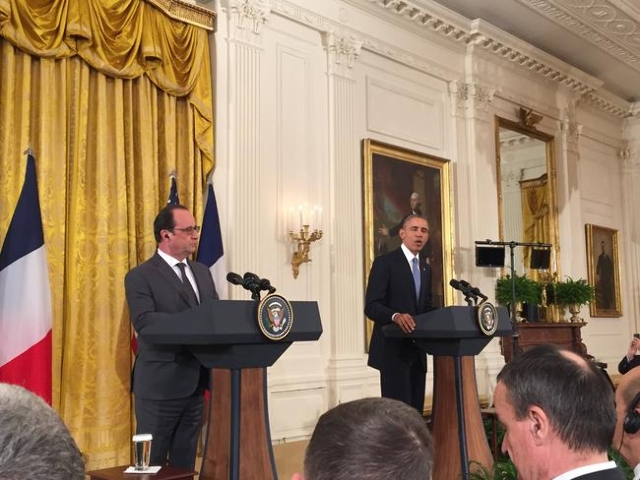Paris authorities issue alert for new terror suspect — PHOTOS
PARIS — The ringleader behind the November 13 shootings and bombings in Paris was on the verge of launching an attack on a financial district in the city when he was killed in a raid last week, Paris prosecutor Francois Molins said Tuesday.
Abdelhamid Abaaoud and another man killed in the Saint-Denis raid were planning a suicide attack against La Defense on November 18 or 19, Molins told reporters. The raid was carried out early on Wednesday, November 18.
Also Tuesday, authorities released the name and photo of another suspect they're searching for in connection to the Paris terror attacks.
Police said Mohamed Abrini was driving the car that was found abandoned in a Paris neighborhood where one of the November 13 shootings occurred. They said he had dropped off one of the bombers who attacked the Stade de France.
Earlier in the day, German police said they did not find another suspected attacker, Salah Abdeslam, after searching an address in the Minden-Luebbecke neighborhood and the surrounding area in northwestern Germany.
Is mystery object a suicide vest?
At the same time, French investigators are trying to determine whether an object found in a garbage bin in a Paris suburb is a suicide vest like those used by the ISIS gunmen and suicide bombers who carried out the attacks that killed 130 people.
Security forces sealed off streets Monday in Montrouge, a suburb just south of Paris, and a bomb squad headed to the scene after investigators found the possible suicide vest. It's not clear if the item contained explosives, Paris police told CNN, but CNN affiliate BFMTV reported that it contained bolts and TATP, the same explosive found in the suicide belts used by the Paris attackers.
BFMTV and the French newspaper Le Monde reported Monday night that Abdeslam's cell phone was tracked to the Montrouge area soon after the attacks. He's been on the run since then, with authorities stopping him near the Belgian border just hours after the coordinated assaults but letting him go because they weren't aware at the time that he could be a suspect.
"The big question is going to be: Is this the suicide vest that Salah Abdeslam was tasked to use?" CNN terrorism analyst Paul Cruickshank said.
Questions have already been raised over whether Abdeslam aborted part of the attacks before fleeing to Belgium.
And there are other questions, too, Cruickshank said. If it is a suicide vest belonging to Abdeslam, why would it have been discovered as late as Monday, 10 days after the attacks? And if it doesn't belong to him, then whose is it?
"It is possible that somebody else may have jettisoned it, an attacker that we don't know much about at this point," Cruickshank said. "So they'll be doing all sorts of forensics, trying to establish who this belonged to, and that will be a huge priority for French investigators."
Local authorities in Montrouge said that the garbage cans in the area are emptied "once or twice a week," Le Monde reported, underscoring the puzzle over how and when the possible suicide vest ended up in one of them.
Parts of the city remain closely watched. On Tuesday, due to a security alert, several subway stations in central Paris were temporarily closed. Trains passed through the stations without stopping, and the the Place de la Republique was briefly evacuated but is being reopened.
Suspect charged in connection with Paris attacks
Some believe Abdeslam was using a support network in Belgium to avoid being captured, more than a week after an international arrest warrant was issued for his arrest in connection with the Paris attacks.
Sources in France close to the ongoing investigation believe Abdeslam could not have survived so long on the run without help. They say that extensive raids in Belgium on Sunday and Monday, in which 21 people were detained in several locations, targeted individuals suspected of a role in the network that organized the attacks.
Seventeen of those arrested have since been released. Authorities charged one man with participating in the activities of a terrorist group in connection with the Paris attacks.
French authorities have said the wave of assaults on their capital was organized in Belgium, with jihadists taking advantage of intelligence gaps and the absence of border controls between the two countries to slip into France undetected.
Several of the men believed to have taken part in the attacks have strong ties to Brussels, notably its suburb of Molenbeek, which has a history of links with terrorism plots.
Brussels remains under highest terrorism alert
So far, the operations in Belgium haven't uncovered Abdeslam, and there's "unprecedented concern" among Belgian authorities, Cruickshank said.
Brussels, which has been under partial lockdown since Friday night, is to remain at the highest terror alert level until at least the start of next week. Schools and the metro will stay closed until Wednesday at the earliest, Belgian Prime Minister Charles Michel announced Monday.
He has warned of the threat of attacks in Brussels similar to those that hit Paris, with militants using guns and explosives to target multiple locations.
"Belgian police don't have a handle on where these guys are and that's why they're shaking the tree so hard," Cruickshank said.
Schools and the subway are set to open Wednesday.
Asked whether an imminent threat had passed, Belgium Foreign Minister Didier Reynders told CNN that it had not but that there are no known "specific targets."
Shopping malls, commercial locations and schools are "not, if we have correct information, the real target," he said.
But in order to protect those areas, officials are beefing up police presence, Reynders said.
The concerns in the aftermath of the atrocities in the French capital stretch well beyond Western Europe. A new U.S. intelligence bulletin warns law enforcement to review training for dealing with active shooters after the Paris attacks showed signs of prior surveillance, tactical planning and military-style training.
Hollande meets with Obama on ISIS fight
Amid the ongoing tensions, French President Francois Hollande is in the midst of a week of whirlwind diplomacy aimed at building a broader global coalition to fight ISIS in its strongholds in Syria and Iraq.
After hosting British Prime Minister David Cameron in Paris on Monday, Hollande met with U.S. President Barack Obama in Washington on Tuesday, then will hold talks with German Chancellor Angela Merkel on Wednesday and travel to Moscow to see Russian President Vladimir Putin on Thursday.
France and Britain are already part of a U.S.-led coalition that's been bombing ISIS targets. Russia has been conducting its own separate airstrikes against ISIS and other groups in coordination with the forces of Syrian President Bashar al-Assad.
Any efforts to form an alliance that includes both Russia and the United States are likely to run into thorny issues like Assad's future role in Syria and international sanctions against Moscow for its interference in Ukraine.
Hollande has vowed to intensify the aerial campaign against ISIS targets, and the French military began Monday to use the aircraft carrier Charles de Gaulle in the eastern Mediterranean to launch strikes.



